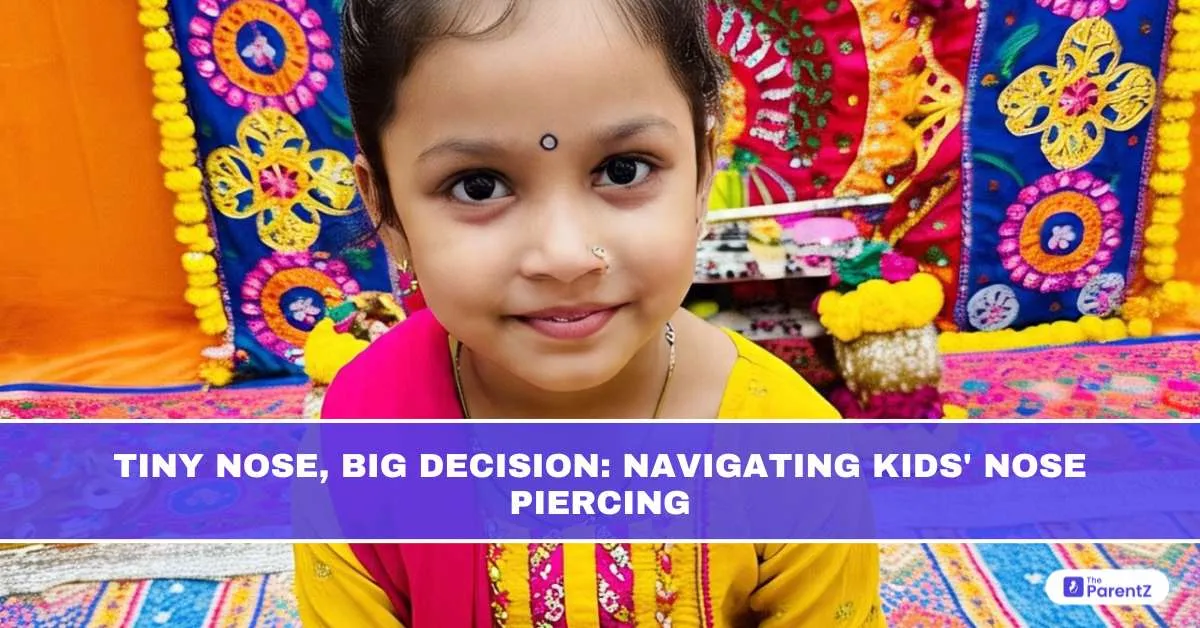Your kiddo just walked up to you with those sparkling eyes and asked, "Can I get my nose pierced?" And there you are, caught between wanting to say yes to their excitement and wondering if they're too young for this step. If this sounds familiar, you're definitely not alone in this tiny-nose-big-decision moment!
It's Not Just a Trend, It's Tradition Too!
Before we dive into the modern world of nose piercings, let's take a quick trip back in time. Nose piercings aren't some wild new invention that kids picked up from TikTok (though social media certainly helps spread the love!). In India, nose piercings have been a beautiful tradition for thousands of years. Little girls often get their noses pierced as babies or toddlers, and it's considered as normal as getting ears pierced in many Western cultures.
The tiny nose stud called a "nath" in Hindi, has been a symbol of beauty, femininity, and even marital status in various Indian communities. So when your child asks for a nose piercing, they're actually connecting with a practice that's older than pizza, and that's saying something!
Why Kids Fall Head Over Heels for Nose Piercings
Let's be honest – kids today are exposed to so much more than previous generations. They see their favorite influencers, celebrities, and even friends rocking cute nose studs, and suddenly, it becomes the coolest thing ever. But it's not just about copying others.
For many kids, a nose piercing represents:
- Self-expression: It's their way of showing their unique style.
- Growing up: It feels like a rite of passage into being more mature.
- Beauty and confidence: Many kids feel it enhances their appearance.
- Cultural connection: Some want to honor their heritage.
- Peer acceptance: Let's face it, fitting in matters at certain ages.
When Is the Right Time?
Here's where things get tricky – there's no magic age written in stone. Some families do it when kids are babies (hello, Indian tradition!), while others wait until the teenage years. The sweet spot often seems to be around 10-14 years old, when kids can:
- Understand the commitment and responsibility
- Follow aftercare instructions properly
- Express their genuine desire (not just a fleeting "want")
- Handle the slight pain and healing process
Remember, maturity matters more than the number of candles on their birthday cake!
Safety First, Because Nobody Wants Drama
If you've decided to go ahead with the piercing adventure, safety should be your best friend. Here's what every parent needs to know:
Choose a professional piercer, not your cousin's friend, who "does piercings on the side." Look for someone who:
- Uses sterile, single-use needles (never guns for nose piercings!)
- Has proper licensing and certifications
- Maintains a clean, professional studio
- Shows you their sterilization process
Material matters big time. Start with high-quality materials like surgical steel, titanium, or 14k gold. Save the cute fashion jewelry for later when everything's healed up nicely.
Helping Your Child Through the Process
The actual piercing takes seconds, but the emotional support lasts much longer. Here's how to be their piercing cheerleader:
Talk them through what to expect – a quick pinch, some watering eyes, and then it's done! Let them bring a friend or sibling for moral support. Sometimes, having their squad there makes all the difference.
During healing (which takes about 2-6 months), help them stick to the cleaning routine. Make it fun by setting phone reminders together or creating a little aftercare chart with stickers. Yes, even teenagers secretly love stickers!
Choosing the Perfect First Piercing
Start simple and small; think tiny stud, not a statement piece. A small, flat-back labret stud or a simple nose bone works great for beginners. Save the hoops and dangly pieces for when everything's fully healed, and they're more experienced with piercing care.
Consider their lifestyle, too. If they're super active in sports, a low-profile stud is probably better than something that might get caught.
The Reality Check
Let's keep it real – some kids will change their minds. That awkward phase where they suddenly think piercings are "weird" might hit. The good news? Nose piercings can close up if they decide they're over it. It's not a tattoo!
Also, be prepared for some judgment from other parents or family members. Not everyone gets the nose-piercing thing, and that's okay. What matters is that you and your child are making an informed decision together.
Making It a Bonding Experience
Instead of seeing this as just another parenting challenge, why not make it a special bonding moment? Research piercing studios together, talk about aftercare, and maybe even plan a little celebration afterward (ice cream, anyone?).
Some families make it a tradition, like getting matching piercings or documenting the experience. It becomes less about "giving in" to your child's request and more about supporting their journey of self-expression.
Conclusion
The bottom line? Trust your instincts, know your child, and remember that a tiny nose piercing doesn't have to be a huge deal. With proper care, professional piercing, and open communication, it can actually be a pretty sweet milestone in your kid's growing-up journey.





Be the first one to comment on this story.